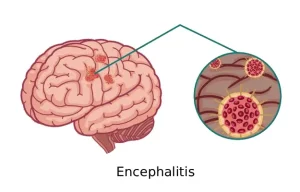Overview
Diagnosis
To diagnose encephalitis, your healthcare professional performs a physical examination and reviews your medical history to identify possible causes and symptoms.
Diagnostic tests include:
• Brain imaging (MRI or CT scan):
These imaging techniques reveal brain swelling or detect other potential causes of symptoms, such as tumors or abscesses. MRI is preferred because it shows finer details of brain tissue changes.
• Spinal tap (lumbar puncture):
A needle is inserted into the lower back to collect a sample of cerebrospinal fluid (CSF) — the fluid surrounding the brain and spinal cord. Changes in CSF composition indicate inflammation or infection. Tests can identify viral or autoimmune causes by detecting infectious agents or antibodies.
• Laboratory tests:
Blood, urine, or throat samples can be analyzed to detect viruses, bacteria, or antibodies responsible for the infection.
• Electroencephalogram (EEG):
EEG measures the brain’s electrical activity through electrodes attached to the scalp. Certain abnormal wave patterns are suggestive of encephalitis.
• Body imaging (CT, MRI, PET-CT, or ultrasound):
Autoimmune encephalitis can be triggered by a tumor elsewhere in the body. Imaging of the chest, abdomen, or pelvis helps locate such tumors, which might be benign or malignant. If a tumor is found, a biopsy (sample removal) confirms the diagnosis.
• Brain biopsy (rare):
If symptoms worsen or treatments fail, a small sample of brain tissue may be surgically removed to determine the cause.
Treatment
Treatment for encephalitis focuses on controlling infection, reducing inflammation, and managing complications. The approach depends on whether the cause is viral or autoimmune.
For mild cases:
-
Bed rest
-
Plenty of fluids
-
Anti-inflammatory medicines such as acetaminophen, ibuprofen, or naproxen to relieve fever and headache
Antiviral medicines:
If the cause is viral, specific antivirals are prescribed:
-
Acyclovir (Zovirax, Sitavig)
-
Ganciclovir
-
Foscarnet (Foscavir)
These are most effective against herpes simplex virus (HSV), which can cause severe brain inflammation. Although insect-borne viruses may not respond, acyclovir is often started early to prevent complications while awaiting test results.
Note: Side effects are rare but can include kidney damage, so kidney function is monitored during therapy.
Autoimmune encephalitis treatment:
If encephalitis is due to an autoimmune response, treatment focuses on suppressing the immune system:
-
Corticosteroids (intravenous or oral) to reduce inflammation
-
Intravenous immunoglobulin (IVIG) therapy
-
Plasma exchange to remove harmful antibodies
-
Long-term immunosuppressive medications, such as:
-
Azathioprine (Imuran, Azasan)
-
Mycophenolate mofetil (CellCept)
-
Rituximab (Rituxan)
-
Tocilizumab (Actemra)
-
If a tumor triggers autoimmune encephalitis, treating the tumor through surgery, radiation, or chemotherapy is essential.
Supportive Care
People with severe encephalitis may need hospitalization and supportive management, including:
-
Breathing support and monitoring of heart and lung function
-
IV fluids to maintain hydration and electrolyte balance
-
Corticosteroids to reduce brain swelling and intracranial pressure
-
Anti-seizure medications to control seizures
Follow-Up and Rehabilitation
Recovery from encephalitis can take time and may require multidisciplinary rehabilitation:
-
Cognitive rehabilitation: Improves memory, attention, and reasoning
-
Physical therapy: Restores strength, coordination, and mobility
-
Occupational therapy: Helps regain independence in daily activities
-
Speech therapy: Rebuilds speech and swallowing abilities
-
Psychotherapy: Helps manage emotional, personality, or behavioral changes
Advertisement

